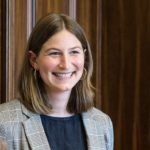Citizen, interrupted
OCTOBER 28, 2020
After more than a decade living in the United States, Santiago Pazos thought he’d be able to vote this year for the first time. He moved to Los Angeles from Spain in 2009, got a green card and eventually started his own business. He became eligible to apply for citizenship earlier this year, and was looking forward to having a say on where his tax dollars go. Then the pandemic hit.

U.S. Citizenship and Immigration Services (USCIS), the federal agency in charge of processing citizenship applications, stopped conducting interviews on March 18. They resumed the interview process in June, on a limited basis. The backlog was exacerbated by public health guidelines that have led to slower application processing times.
Boundless Immigration, a tech company that helps immigrants obtain green cards and citizenship, estimates that USCIS has interviewed 91,000 of the 381,000 applicants who would normally have expected to vote in November. In California, the company estimates that delays have meant that 62,668 citizenship applicants have had to sit out this election.
USCIS spokesperson Dan Hetlage said in a statement, “We are working to increase the number of interviews we can complete in a safe manner, but it will take time before we can reach pre-March levels.” USCIS has cleared the 110,000 person backlog of those who were waiting to take the Oath of Allegiance when offices closed in March, Hetlage said. That backlog does not account for applicants waiting for interviews before March and thereafter, who could have been approved and naturalized in time to vote.
While much of the nation is working remotely, USCIS continues to require citizenship applicants to attend interviews and take the oath in person. And now California has fewer locations where naturalization ceremonies take place. The Central Court of California—which serves seven counties, including Los Angeles County—suspended its ceremonies until further notice and delegated authority to USCIS to perform them.
The CEO of Boundless Immigration, Xiao Wang, called the citizenship oath ceremony a “wonderfully emotional and critical moment.” As a child, he watched his own parents become naturalized.
Despite its significance, Wang described the oath ceremony as a “fundamentally administrative task” that could be performed online, if USCIS changed its own rules.
USCIS has amended some protocols due to the pandemic. According to Hetlage, it developed formats that allow for shorter ceremonies and social distancing, including curbside and drive-up ceremonies where applicants stay in their cars as they take the oath.
Pazos wouldn’t mind foregoing an in-person ceremony. “I don’t really care,” he said. “I just want to be able to vote.”
Not this year.
Sofie Kodner is a reporter at UC Berkeley’s Graduate School of Journalism.


